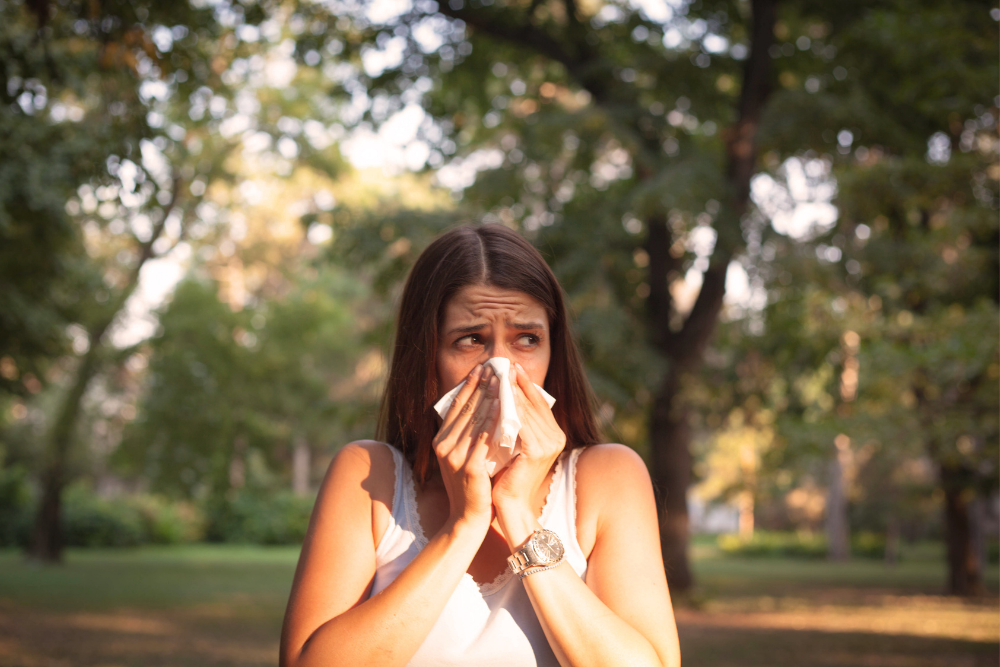Common Summer Allergies

Summer is in full swing – so why are you still struggling with spring allergies?
Unfortunately, sunny skies and backyard BBQs are the only things the summer season brings. It also comes with a host of common allergy triggers that can keep you sniffling and sneezing long into the dog days of summer. Because we tend to spend more time outside during summer than in any other season, many allergy sufferers find it’s actually the worst time for their allergy symptoms.
If allergies are making it hard to enjoy your summer fun, here’s what you need to know.
What are summer allergies?
Like any seasonal allergy, summer allergies are an immune response to certain allergens in the environment. When you are exposed to these triggers, your body treats them as an intruder by releasing chemicals like histamines and prostaglandins to attack the foreign substance. Unfortunately, these chemicals also cause a cluster of allergic symptoms like sneezing, a runny or stuffy nose, itchy eyes, scratchy throat, etc.
Summer allergies occur from late May until September, usually peaking in June and July.
What causes summer allergies?
There are a few common causes of summer allergies depending on your climate and location. Here in South Alabama, summer allergies are commonly caused by:
Tree Pollen. Early summer allergies may be due to tree pollen, which begins in February and can last well into June. Our warm climate and windy days makes pollen seasons even longer, and tree pollen can often overlap with…
Grass Pollen. Grass pollen is the most common cause of summer allergies. Grasses pollinate all summer long, hitting their peak in June and July. Along the Eastern Shore, grasses like Bermuda and Bahai grass are the most common culprits of summer sniffles.
Mold. Mold spores are another common cause of summer allergy symptoms. Mold can be found outdoors in yard debris or piles of grass as well as inside your home in damp, warm conditions like bathrooms and basements.
Ragweed. Ragweed begins to bloom in late summer, and each plant can produce as much as 1 billion pollen grains per season. These light, sticky grains are easily spread by the wind and highly triggering to those with outdoor allergies.
How do you combat summer allergies?
The best way to avoid summer allergy symptoms is to limit your exposure to known triggers. This can include:
- Checking local pollen counts and avoiding peak pollen times like early morning or late afternoon.
- Wear protective clothing when doing yard work or engaging in outdoor activity that could expose your skin to grass or weed pollen.
- Change and shower quickly when coming indoors and wash your bedding frequently.
- Keep doors and windows closed as much as possible. Install an indoor air filter if your allergies are severe.
- Take allergy medications like over-the-counter antihistamines to minimize your symptoms.
Summer allergies are usually harmless, but severe symptoms can leave you feeling pretty miserable. If you need help managing your allergy symptoms or think you may have a more serious respiratory illness, visit Urgent Care of Fairhope! Our expert staff can diagnose your issue and get you the treatment you need to feel better fast – no appointment necessary.
Search our Blog
Recent Posts
2025 Summer Camp Guide: Eastern Shore, Alabama
School’s out for summer! While the kids are rejoicing, we know many parents are picturing long days of screen time, junk food and boredom. If you haven’t scheduled a summer camp experience for your [...]
Easy, Nutritious Summer Treats Your Kids Will Actually Eat
Summer break in Fairhope means beach days, splash pads, and the inevitable chorus of "I'm huuuungry!" approximately every 17 minutes. With schedules all over the place and kids burning energy faster than your phone battery [...]
Memorial Day Safety: Tips for a Healthy Start to Summer
Memorial Day weekend is that magical time when we dust off the grill, break out the beach chairs, and officially declare summer open for business on the Eastern Shore. At Urgent Care of Fairhope, we [...]
Low-Carb Snacks for Diabetic Kids: Tasty, Fun, and Blood Sugar-Friendly
Finding the right snacks for kids with Type 1 diabetes can feel like a challenge. You want something delicious, but also something that won’t send their blood sugar on a rollercoaster ride. The key? Low-carb, [...]
Measles Guide for Parents: What You Need to Know
Recent measles outbreaks have many parents on high alert, and with good reason—measles is one of the most contagious viruses in the world. While it was once considered a routine childhood illness, modern medicine has [...]
Everything You Need to Know About the Fairhope Arts & Crafts Festival
In Fairhope, it doesn’t really feel like spring until we’re counting down the days to our favorite annual springtime event: the Fairhope Arts and Crafts Festival. Now in its 73rd year, this downtown celebration is [...]

